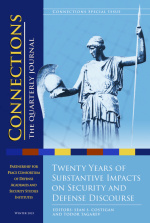Armed forces constitute the foundation for the defense and security of their societies. They protect against external threats and, when required, provide coercive power. As a corporate body, they play a prominent role in the ordering of the nation’s affairs, in the development of national security policy, and in the allocation of national resources. Their role is guided by a single principle: their subordination to democratically elected political leadership. This democratic control ensures they serve the societies they protect.
This article identifies the key elements needed to ensure effective democratic control. It examines the role of the executive in the organization and employment of the armed forces and the legislature in providing oversight and accountability. The tensions in defining competence and responsibility where the political and military worlds and perspectives intersect are alleviated in the process of fusion, collision, or reconciliation at all levels, from policy to operations. Democratic control must reflect societal developments as in the influence of information technology or the impressive “genderization” of defense and security. Two decades of transition in Europe have shown that democratic control is a process in which each country adapts the basic principles to its own circumstances.
Reviewed article
Ensuring Democratic Control of Armed Forces – The Enduring Challenges
Article statistics
Bibliography
“Building Integrity in Defence,” DCAF Parliamentary Brief (Geneva: DCAF, 2015), https://e731hasugp.preview.infomaniak.website/publication/parliamentary-brief-building-integrity-defence/
“Holding the Executive Accountable: The Changing Role of Parliament in the Budget Process,” Palais du Luxembourg, Paris – an international symposium for chairpersons of parliamentary budget committees, January 24-25, 2001.
“Right to Association for Members of the Professional Staff of the Armed Forces,” Committee on Legal Affairs and Human Rights, Document 9518, July 15, 2002, http://www.assembly.coe.int/nw/xml/XRef/X2H-Xref-ViewHTML.asp?FileID=9808
“The commission of inquiry by the Belgian Senate, on the murder of Belgian peacekeepers in Ruanda,” December 6, 1997.
“The Role of the NATO Parliamentary Assembly,” presentation to the Fourth PCAF Workshop on Strengthening Parliamentary Oversight, Brussels, July 12-14, 2002.
“Women on the Path to Peace,” The World Today 79, no. 1 (Chatham House, February/March 2023), https://www.chathamhouse.org/publications/the-world-today/2023-02
Anniversary – NATO Parliamentary Assembly, 50 years of Parliamentary Diplomacy (Brussels, 2005).
Betz, David, “Comparing Frameworks of Parliamentary Oversight: Poland, Hungary, Russia, Ukraine,” paper presented to a seminar on Democratic Control of Armed Forces in Croatia, Zagreb, October 26, 2001.
Biden, Joseph R., and John B. Ritch III, “The War Powers at a Constitutional Impasse: A ‘Joint Decision’ Solution,” Georgetown Law Journal 77, no. 2 (December 1988).
Born, Hans, and Marlene Urscheler, “Democratic Accountability and Parliamentary Oversight of Multinational Peace Support Operations,” presentation to the Fourth PCAF Workshop on Strengthening Parliamentary Oversight, Brussels, July 12-14, 2002.
Clark, Wesley K., Waging Modern War: Bosnia, Kosovo, and the Future of Combat (New York: Public Affairs, 2001).
Cragg, Anthony, “Democratic Accountability of Armed Forces,” the NPA Seminar, Prague, April 1995.
Dandeker, Christopher, “On the Need to Be Different: Military Uniqueness and Civil-Military Relations in Modern Society,” RUSI Journal 146, no. 3 (June 2001).
Feaver, Peter D., “Civil Military Relations,” in The Annual Review of Political Science, vol. 2 (June 1999); and Rosa Brooks, “The US Civil –Military Relations in Crisis?” Parameters 51 (2021).
Fisher, Louis, “Congressional Checks on Military Initiatives,” Political Science Quarterly 109, no. 5 (Winter 1994-95): 739-76.
General Sir Peter De la Billière, Storm Command: A Personal Account of the Gulf War (London: Harper Collins, 1992).
George, Bruce, “Armed Forces in Democratic Societies,” Herstmonceaux Castle, July 23-26, 1966.
Tagarev, Todor, “Parliamentary Oversight of National Defence Industries in NATO Countries,” in Parliamentary Oversight of National Defence Industry, ed. Grazvydas Jasutis, Teodora Fuior, and Todor Tagarev (Brussels, Geneva: NATO Parliamentary Assembly and DCAF, 2022), 23-40, https://www.dcaf.ch/sites/default/files/publications/documents/ParliamentaryOversightNationalDefenceIndustry_EN.pdf
Taylor, Telford, Sword and Swastika: Generals and Nazis in the Third Reich (New York: Simon and Schuster, 1952).
Williams, Nicholas, “NATO Operations”, in Research Handbook on NATO, ed. Sebastian Mayer (Cheltenham, UK: Edward Elgar Publishing, 2023).
Winslow, Donna J., “The Parliamentary Inquiry into the Canadian Peace Mission in Somalia,” presentation to the Fourth PCAF Workshop on Strengthening Parliamentary Oversight, Brussels, July 12-14, 2002).
Women In International Security (WIIS),2024, https://wiisglobal.org/
Woodward, Sandy, “None of our plans seem to hold up for more than twenty four hours, as Mr. Nott (Defence Minister) footles about, wringing his hands and worrying about his blasted career.” In Admiral Sandy Woodward with Patrick Robinson, One Hundred Days: The Memoirs of the Falklands Battle Group Commander (Annapolis, MD: Naval Institute Press, 1992).

